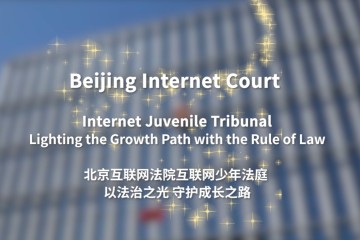BIC reports on digital service-related trials, judicial rules
The Beijing Internet Court (BIC) held a press conference on March 17 to report on trials and judicial rules pertaining to network service contract-related cases. BIC Vice-president Zhao Ruigang hosted the briefing.
Since its establishment on Sept 9, 2018, the BIC has accepted 2,287 cases related to online service contracts, 80 percent of which were in such areas as travel ticketing, information sharing, online shopping platforms and second-hand transactions.
In terms of litigation content, new business forms such as livestream e-commerce and digital marketing, and new business models such as advance-screening on demand and PK style livestream selling were emerging.
Most plaintiffs in these cases were middle-aged or younger online consumers, and most defendants were online platforms, accounting for 97.2 percent. The top 15 entities by case amount were all online platform companies, involving 1,502 cases and accounting for 64.7 percent.
The trend of diversified digital services was obvious according to the litigation claims. Apart from financial claims, spiritual needs were claimed as well, which reflected an in-depth binding between the consumers' spiritual lives and the online service contents.
From the trials, the BIC has spotted the following major issues in the online service field. First, some online service providers failed to provide clear identities. This issue is more prominent on those online platforms which provide integrated services. Second, some online services were not standardized. Issues here included inadequate notification of standard terms, vague new service standards and concealed false advertising. Third, some dishonest behaviors undermined the general consumption environment, infringed on the consumers’ interests and were not conducive to creating a clean consumption environment.
To tackle the aforementioned challenges, the BIC has proactively offered judgment rules, striving for a standardized, orderly and positively-progressed digital service arena. Major actions include clarifying the legal relationship between all parties in the new network service scenarios.
Via detailed business model analysis, the BIC provided judicial guarantee to protect consumers' rights by determining the legal relations and establishing judgment rules under current legal framework. And then, it determined the main responsibilities of service providers. For example, the BIC has determined that standard terms have significant impact on consumers and that when an agreement contains stipulations different from the standard understanding, consumers should be informed in a notable way; and if they are not, the agreement will have no legal effect on them.
The BIC went on to protect consumers' legitimate rights and interests from a higher level and on a bigger scope. To achieve a standardized and orderly environment for online service industries' development, it gave judgments to stop irrational and dishonest customer behaviors and restrict unreasonable demands from consumers.
Six typical cases related to online service contracts were briefed at the press conference. They covered areas such as second-hand transactions, livestream selling, takeout deliveries, hotel booking, gaming and retail pricing speculation.

 Judicial White Paper
Judicial White Paper
 Play
Play Play
Play Online Lawsuit Guide
Online Lawsuit Guide Beijing Internet Court Lawsuit Service WeChat Account
Beijing Internet Court Lawsuit Service WeChat Account  Beijing Internet Court WeChat Account
Beijing Internet Court WeChat Account